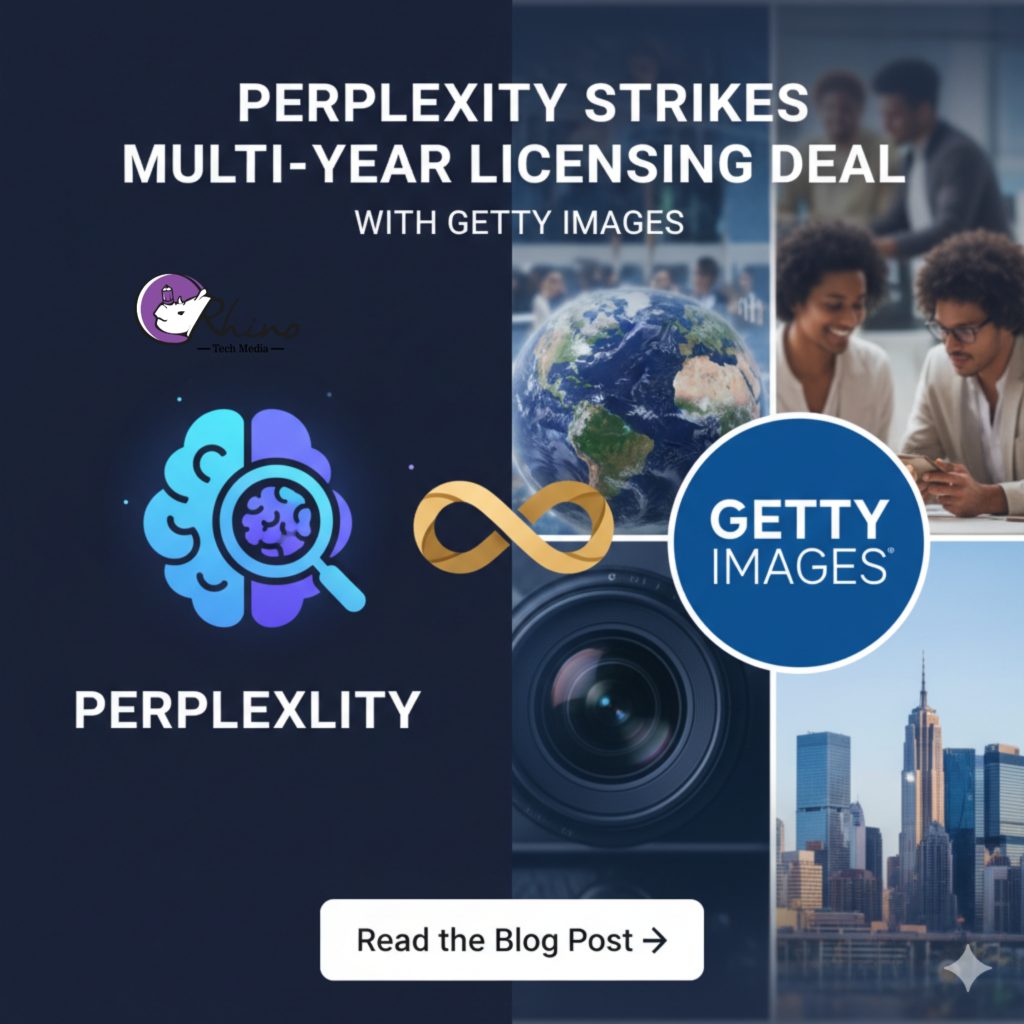On October 31, 2025, Perplexity — the AI search and discovery startup — and Getty Images announced a global, multi-year licensing agreement that allows Perplexity to display Getty’s editorial and creative images inside its AI-powered search and content workflows. The partnership is explicitly designed to integrate Getty’s imagery via its API, improve how images are presented (including adding image credits and links to sources), and give Perplexity users direct access to a large library of professionally produced visuals.
Background and context
Perplexity has grown quickly as an AI search tool that surfaces concise answers and multimedia, but the company has also faced repeated legal and reputational challenges over content usage. In the past year(s) several publishers and news organizations have accused Perplexity of copying or surfacing copyrighted material without adequate licensing, and publishers including major media groups have sued AI companies for similar practices. Getty itself has been a central actor in the broader industry debate over how photographic and editorial content should be used by AI systems, pursuing litigation or licensing approaches to protect creators’ rights. The new deal with Getty should be read against that backdrop of mounting pressure for formal licensing and clearer attribution practices.
Deal mechanics and immediate effects
According to the official announcement, the agreement gives Perplexity rights to display Getty’s images across its search and discovery interfaces and ties into Getty’s API technology so images are integrated into Perplexity’s content creation and display workflows. Perplexity has committed to improving on-screen attribution by showing image credits and links back to Getty’s source pages — a step Getty framed as educating users on legal, licensed image use. The agreement is described as “multi-year” (no exact term disclosed in the public release), which suggests an ongoing commercial relationship rather than a one-off trial.
The market reacted sharply: Getty’s shares jumped substantially on the news in early trading — various outlets reported surges ranging from roughly 50% to more than 60% in pre-market or early trading, underscoring investor interest in monetizing visual content through AI distribution deals. (Estimates of the stock move vary slightly across reports.)
Why the deal matters (industry and legal implications)
- A move toward licensed AI ecosystems. The agreement signals a larger industry trend: AI companies are shifting from ad-hoc scraping of visual content toward negotiated licenses that compensate content owners and clarify usage rights. For rights-holders, licensing offers revenue and control; for AI firms, it reduces legal risk and improves trust with partners and customers.
- Attribution and user education. By committing to visible image credits and links, Perplexity is adopting an approach that foregrounds provenance — which may reduce accidental misuse by end users and help channel traffic (and potential licensing revenue) back to Getty and the original creators. This design change also helps address one of the core complaints from publishers and photographers: opaque or unattributed reuse that cloaks original sources.
- Commercial model and precedent. While detailed financial terms were not released publicly, the deal likely includes licensing fees and may create templates for revenue sharing between AI platforms and content creators or distributors. If the partnership proves commercially viable, other AI firms (search, image-generation, or multimodal tools) may pursue similar agreements — accelerating a shift in the economics of visual content.
- Risk management for Perplexity. The agreement helps Perplexity address the legal exposure and reputational damage caused by earlier disputes alleging unauthorized use of publishers’ text and images. A formal license with Getty — one of the most prominent stock and editorial image houses — is both a practical and symbolic step toward compliance. However, it is unlikely to resolve all outstanding legal claims from media outlets unless those suits are addressed separately.
Potential limitations and open questions
- Terms and scope. Public reporting calls the deal “multi-year” and notes global coverage, but companies have not disclosed precise term lengths, price points, or whether the license includes rights beyond display (for example, re-use in training models or derivative generation). Those details will determine how far the license protects Perplexity and how much revenue flows to Getty and creators.
- Retroactive use and past disputes. Reports suggest the agreement “legitimizes” some prior Perplexity use of Getty images, but whether the license is retroactive or whether it settles past claims is unclear. Legal claims from other publishers or rights-holders remain separate matters.
- Broader market impact. The immediate market reaction shows investor enthusiasm for monetizing content in AI workflows, but long-term effects depend on whether other major content owners sign similar deals and whether users accept a model that routes premium content behind licenses rather than free scraping.
Conclusion
Perplexity’s multi-year licensing deal with Getty Images is a noteworthy milestone in the evolving relationship between AI platforms and content owners. It pairs Perplexity’s AI discovery capabilities with Getty’s authoritative visual inventory, while also addressing key industry pressures — copyright risk, provenance, and creator compensation — through licensing and enhanced attribution. The agreement is both practical (granting Perplexity access to licensed imagery) and symbolic (signaling a broader industry pivot from informal scraping toward negotiated commercial relationships). How this model scales — and whether it becomes the norm for other AI firms and content categories — will depend on the contract details, subsequent deals between rivals and rights-holders, and the outcomes of ongoing copyright disputes in the AI era.

